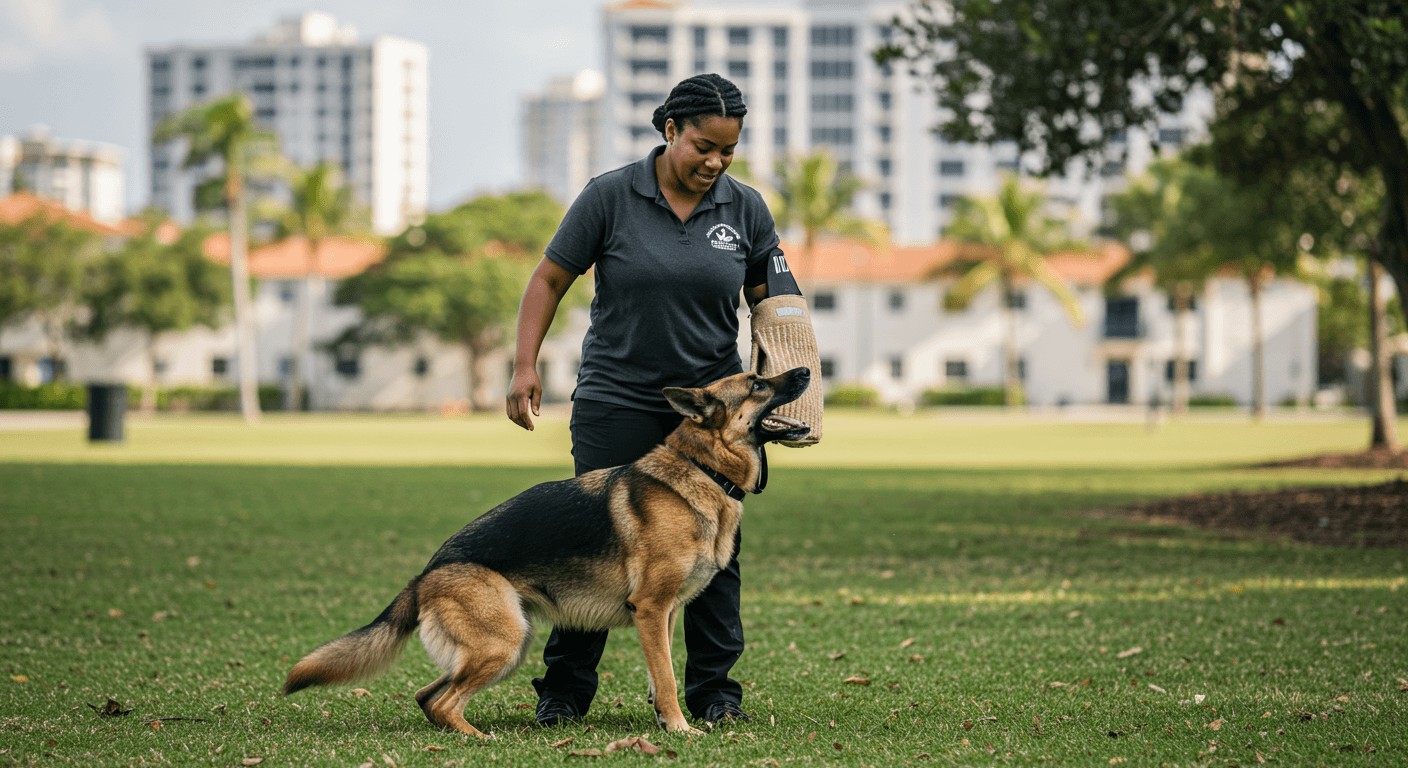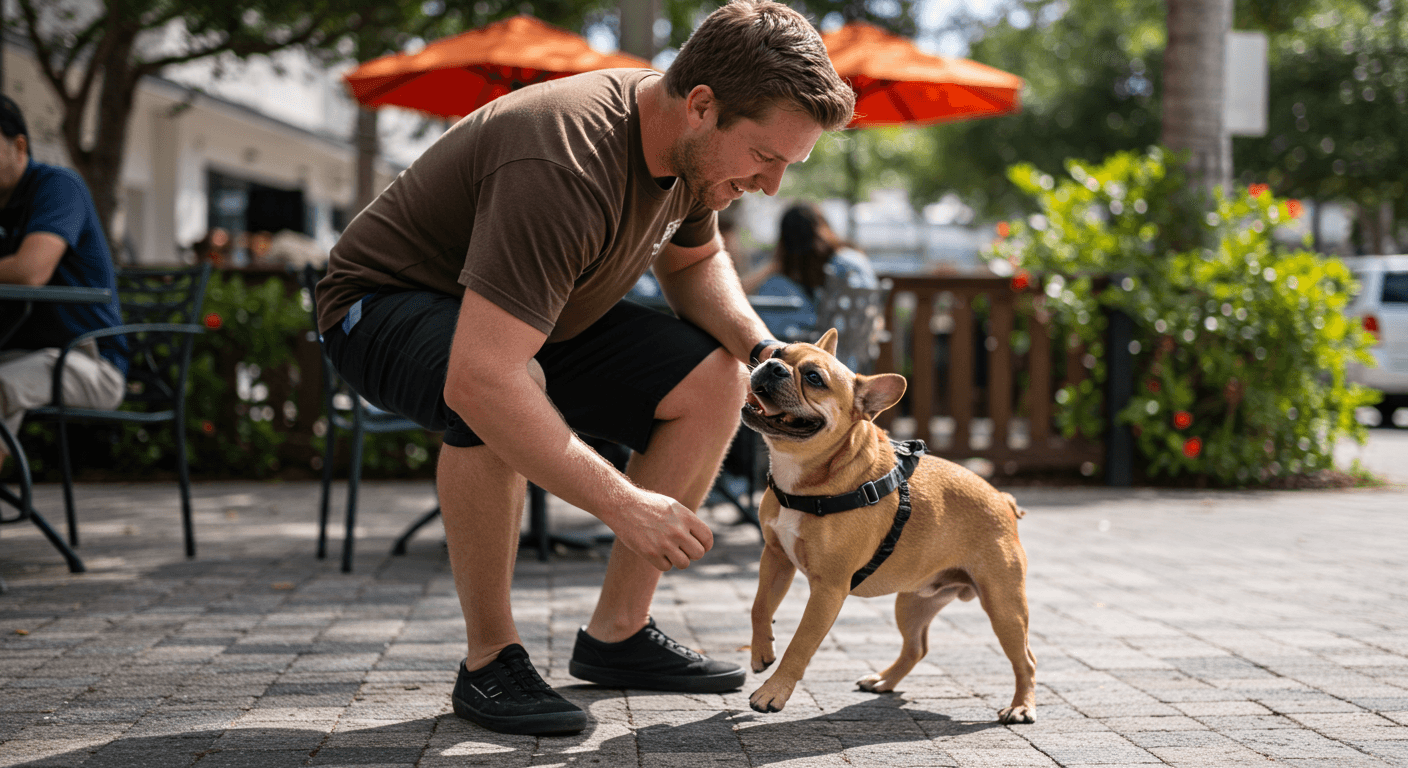Your Complete Guide to Choosing a Dog Trainer in Fort Lauderdale
Living with a dog in Fort Lauderdale means navigating Las Olas Boulevard sidewalks, enjoying the Riverwalk, and visiting beaches where your dog needs to stay calm around crowds and distractions. Whether you’re in Victoria Park, Coral Ridge, Rio Vista, or Colee Hammock, your dog will encounter tourists, other dogs, and plenty of excitement that requires solid training to manage safely.
Fort Lauderdale sits in Broward County, so local rules follow both city and county guidelines. Finding a trainer who understands these specific regulations and the unique challenges of coastal living will help your dog succeed in real-world situations.
How to Choose the Right Trainer
Start by looking for someone who uses positive reinforcement training and can tailor a training program to fit your Fort Lauderdale lifestyle. Your dog should learn to walk politely through busy areas like Las Olas, stay focused near beachgoers and waterfront dining, and handle boat dock distractions without lunging or barking.
Credentials help you compare experience levels quickly. Look for dog trainer certifications like CPDT-KA, KPA-CTP, or IAABC-CDBC for behavior problems. If your dog shows serious aggression or fear, seek someone with CBCC-KA or structured behavior modification experience.
In-home dog training works well for jumping on guests, door manners, barking issues, and leash reactivity right in your neighborhood. Group classes make sense once your dog can focus around other dogs and people, which prepares them for the busy parks and public spaces around the city.
Private lessons give you one-on-one attention for specific issues like separation anxiety or resource guarding. Board and train programs can speed up results if you need faster progress or lack time for daily practice.
Ask about a free consultation or free evaluation to see if the trainer’s style matches your goals and your dog’s temperament.
Common Dog Training Methods Explained

Reward-based methods create lasting behavior changes while building trust between you and your dog. These humane approaches also help you follow Broward County’s animal control requirements about keeping dogs safely managed in public.
Basic obedience covers sit, down, stay, come, place, and loose-leash walking so your dog can handle restaurant patios, shopping areas, and waterfront attractions without pulling or jumping. These skills form the foundation for a well-behaved dog who can enjoy everything Fort Lauderdale offers.
Puppy training focuses on socialization, potty training, bite inhibition, crate comfort, and early leash skills. Starting young prevents bad habits from forming and helps your puppy adjust to city sounds, beach activity, and crowds.
Behavior modification addresses fear, reactivity, resource guarding, or separation anxiety through careful desensitization and counterconditioning. For serious cases, your professional dog trainer should work with your veterinarian to rule out medical causes and coordinate care.
Dog training classes provide structured environments where dogs learn to focus despite distractions. The best group classes screen participants carefully, give dogs enough space, and teach calm behavior instead of overexcitement.
Service dog training and therapy dog training require specialized skills, public-access training, and clear standards. These programs need extra structure and consistency beyond typical obedience training.
Avoid trainers who rely on fear, pain, or intimidation to get results. These methods damage trust, create new behavior problems, and can violate local animal welfare standards.
Average Cost of Dog Training in Fort Lauderdale FL (Updated for 2025)
Prices in Fort Lauderdale and Broward County vary based on the trainer’s experience, session length, and training location. Here’s what most local dog owners are paying in 2025.
| Service Type | Average Cost (Fort Lauderdale/Broward County) |
|---|---|
| Puppy classes (4-6 weeks) | $175-$300 total |
| Group obedience classes (4-6 weeks) | $180-$325 total |
| Private lessons (60-90 min) | $125-$225 per session |
| In-home training packages (4-6 visits) | $475-$1,050 total |
| Day training (trainer works your dog) | $500-$1,100 per week |
| Behavior consult for reactivity/anxiety (initial) | $175-$300 |
| Board and train (2-4 weeks) | $2,400-$5,200 total |
You may pay additional travel fees for trainers coming from other parts of Broward County. Behavior modification for aggressive dog training or complex anxiety typically costs more than basic obedience due to the specialized expertise required.
Make sure you understand what’s included in the price, how progress gets tracked, and whether follow-up support is available after the training sessions end.
Questions to Ask a Potential Dog Trainer
- What training methods do you use, and how do you keep sessions positive and stress-free for my dog?
- What credentials do you hold, like CPDT-KSA or CTC, and do you pursue continuing education?
- How will you customize the training for my dog’s temperament and our Fort Lauderdale lifestyle?
- Do you offer in-home sessions, group classes, or board and train, and which approach fits my goals best?
- How will we measure progress and know when my dog is ready for more challenging distractions?
- What are the total costs, including travel fees, and what’s your cancellation policy?
- Do you carry liability insurance, and can you provide proof of coverage?
- For behavior issues, will you coordinate with my veterinarian if needed?
- What should I practice between sessions to help my dog improve?
- Can you provide references from other Fort Lauderdale clients with similar training needs?
Local Fort Lauderdale Rules and Considerations
Fort Lauderdale enforces leash laws and animal control ordinances to keep public spaces safe for residents and visitors. Broward County oversees animal welfare and licensing requirements as well.
Leashes are required in all public areas except designated off-leash dog parks. Keep a sturdy 6-foot leash with you for walks through neighborhoods, along the beach, and at outdoor events. Retractable leashes aren’t recommended for training because they don’t provide enough control.
Florida law requires current rabies vaccination for all dogs. You’ll need to register your dog with Broward County Animal Care and get a county license within 30 days of moving to the area or acquiring a new dog. Visit the Broward County Animal Care website for licensing information and vaccination clinics.
Fort Lauderdale beaches have specific rules about dogs. Dogs are not allowed on Fort Lauderdale beach sand or in beach waters at any time. However, dogs can walk on the beach path and adjacent sidewalks if leashed. Check city ordinances before visiting waterfront areas with your dog.
Excessive barking can result in noise complaints and fines. Work with your trainer on alert barking, separation anxiety, and boredom behaviors before neighbors file complaints with code enforcement.
Florida doesn’t require special licenses for dog trainers, but trainers who board dogs must meet state boarding kennel requirements. Check that any board and train facility follows proper health and safety standards.
Broward County considers dogs dangerous if they’ve bitten or attacked people or other animals. Owners of dangerous dogs face strict liability and must follow special containment and insurance requirements.
Local Fort Lauderdale Resources for Dog Owners
These locations give you places to practice leash training, socialization, and basic obedience in real-world settings. Always follow posted rules and practice good dog park etiquette.
- Canine Cove Dog Park at Snyder Park offers separate areas for large and small dogs with shade structures and water stations. The park is well-maintained and popular for socialization and off-leash recall practice.
- Dr. Paul’s Pet Care Center Dog Park features fenced play areas, agility equipment, and plenty of space for training exercises. It’s a solid choice for working on focus around other dogs.
- Bark Park at Plantation Central Park in nearby Plantation provides another excellent option with separate small and large dog sections and ample room for practicing commands.
- Hugh Taylor Birch State Park welcomes leashed dogs on trails and picnic areas, giving you great opportunities to work on loose-leash walking and focus around wildlife and other park visitors.
- Las Olas Boulevard sidewalks are perfect for practicing polite greetings, attention, and impulse control around restaurant patios and pedestrian traffic.

FAQs
How much does in-home dog training cost?
Most Fort Lauderdale trainers charge $125-$225 per in-home visit, with package discounts available when you book multiple sessions. Behavior modification for issues like reactivity or aggression typically starts at the higher end of that range due to the specialized skills required.
Is in-home dog training worth it?
Yes, because you’re addressing problems exactly where they happen. Your trainer can work on door manners, jumping on guests, barking at passersby, and backyard reactivity in your actual home environment, then step outside to practice leash skills on your neighborhood streets.
Can you pay someone to house train your dog?
Absolutely. Many trainers offer puppy training packages that include potty training, crate routines, and housebreaking schedules. Day training can speed up the process while teaching you how to maintain consistency after the trainer leaves.
What is the 3-3-3 rule for dog training?
This timeline helps set realistic expectations for new or adopted dogs. Expect about 3 days for your dog to decompress, 3 weeks to learn your household routines, and 3 months to feel fully settled. Good training programs work with this natural adjustment period rather than rushing progress.
How long will it take to reach my training goals?
Most puppies and friendly adult dogs show noticeable progress within 4-8 weeks with daily practice. Issues like reactivity, fear, or aggression typically require several months of careful behavior modification with gradual increases in difficulty and distractions.
What should I bring to group classes?
Pack a flat collar or harness, a 6-foot leash, high-value treats your dog loves, water, waste bags, and current vaccination records if your trainer requests them. Leave retractable leashes at home because they make it harder to maintain control in group settings.
What’s the leash law in Fort Lauderdale?
Dogs must be leashed and under control in all public areas except inside designated off-leash dog parks. This includes sidewalks, parks, the beach path, and any city-owned property. Leashes cannot exceed 6 feet in length in most public spaces.
Do I need a dog license in Fort Lauderdale or Broward County?
Yes. Broward County requires all dogs to be licensed within 30 days of acquiring the dog or moving to the county. Licenses are available through Broward County Animal Care and require proof of current rabies vaccination. Licenses must be renewed annually.
What shots does my dog need in Broward County or Florida?
Florida law requires rabies vaccination for all dogs. Your veterinarian may also recommend distemper-parvo combination vaccines, bordetella for kenneled dogs, and leptospirosis depending on your dog’s lifestyle and exposure risks. Keep vaccination records accessible for licensing and boarding.
Are dog trainers required to be licensed in Fort Lauderdale or Broward County or Florida?
No special licenses exist for dog trainers in Florida. Trainers operate as regular businesses and don’t need state certification to offer dog training services. However, facilities that board dogs must meet Florida’s boarding kennel regulations through the Department of Agriculture.
Where can I practice off-leash recall?
Use fenced dog parks like Canine Cove Dog Park at Snyder Park or Dr. Paul’s Pet Care Center Dog Park to practice off-leash commands safely and legally. Visit during quieter times when you’re first teaching recall to minimize distractions.
Which dog parks allow training around Fort Lauderdale?
Canine Cove Dog Park at Snyder Park, Dr. Paul’s Pet Care Center Dog Park, and Bark Park at Plantation Central Park all welcome training activities within their fenced areas. These parks provide safe spaces to work on commands, socialization, and off-leash skills.
What beaches or trails allow dogs for training?
Dogs are not allowed on Fort Lauderdale beach sand or in beach waters, but they can walk on the beach path and adjacent sidewalks while leashed. Hugh Taylor Birch State Park welcomes leashed dogs on trails and in picnic areas, offering excellent training opportunities around wildlife, cyclists, and other park visitors.
What should I do if my dog is reactive on walks?
Work with a professional dog trainer who specializes in reactivity and behavior modification. Start training in low-distraction environments and gradually increase difficulty as your dog improves. In the meantime, avoid peak walking times on busy streets and give your dog enough space from triggers to stay below threshold.
Can I bring my dog to outdoor restaurants in Fort Lauderdale?
Many Fort Lauderdale restaurants with outdoor patios welcome well-behaved dogs, especially along Las Olas Boulevard. Call ahead to confirm the restaurant’s policy, and make sure your dog can settle calmly without barking, jumping, or begging before attempting restaurant visits.
The right combination of skilled instruction, humane methods, and consistent practice around Fort Lauderdale’s unique urban and coastal environment will help your dog become a confident, well-mannered companion. Expert dog trainers who understand local challenges can help your dog succeed whether you’re strolling the Riverwalk, visiting dog-friendly patios, or simply enjoying your neighborhood. If credentials matter to you, don’t hesitate to ask about certifications and how your trainer stays current with the latest training techniques.
